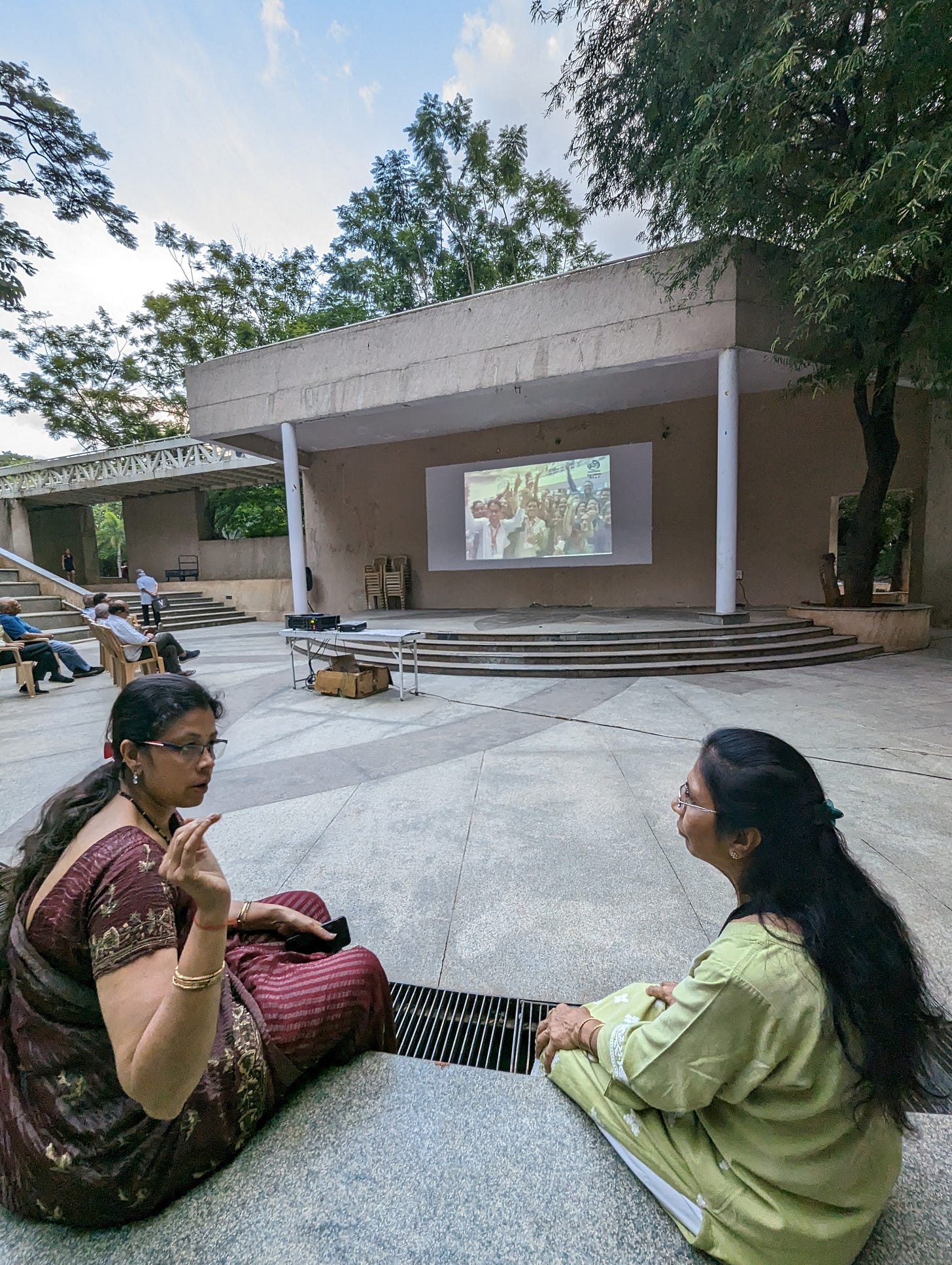The time is ripe: when ideas become obvious
TK #4: Was 1969 the right time for India to start a space programme? Why theories of gender identity gained focus in the third wave of feminism? What can agriculture teach us about democratic values?
Dear Readers,
Thanks for coming back to TK.
If you are new here and would like to know more about this newsletter, see this.
I wrote this edition intending to send it out on Independence Day. I am more than a week late. Quite often I fail to account for unplanned disruptions to my carefully laid out work plans. These can be health, menstruation, or family commitments. This is something I want to delve into in the future–but for now, here’s what I have in store.
This past week I went down to the amphitheatre in the society that I live in twice. I rarely ever participate in events held there. But on August 15, there were celebrations to mark 76 years of freedom, and on August 23, the residents came together to celebrate the success of Chandrayaan 3. The former was a song-and-dance affair where mostly children and women danced to patriotic songs. The latter was a viewing party, where men, women, and children cheered the ISRO team.

In the weeks preceding that, and now, there is a question that lurks in my mind: What is ripeness in creative processes and discoveries, ideas and inventions?
I have no answers but a lot of questions. So in today’s TK, I bring you thoughts on the idea of ripeness and cultivating feminism and democracy.
The time is ripe…
…is a popular idiom. It means it’s a suitable time for an activity. But as my friend Mukunth Vasudevan wrote on his blog, several scientists and mathematicians have explored and embraced the value of ripeness. In this post, Mukunth shared an excerpt from science journalist Allyn Jackson’s article on French mathematician Alexander Grothendieck:
One thing Grothendieck said was that one should never try to prove anything that is not almost obvious. This does not mean that one should not be ambitious in choosing things to work on. Rather, “if you don’t see that what you are working on is almost obvious, then you are not ready to work on that yet,” explained Arthur Ogus of the University of California at Berkeley. “Prepare the way. ...
If I were to absolutely reduce it to one sentence, it seems to define the adage: “an idea whose time has come.” But how do we–or rather, scientists, creators, theorists, academics, writers, and so on–know the time has come? And should we stop our engagement with–and advancement of–other things because the time isn’t right?
The answer seems to be no.
“Prepare the way…” reminds me of the words of Samuel Johnson, who created the first dictionary in 1755. In his rather gloomy preface, he wrote:
Among these unhappy mortals is the writer of dictionaries; whom mankind have considered, not as the pupil, but the slave of science, the pioneer of literature, doomed only to remove rubbish and clear obstructions from the paths of Learning and Genius [emphasis added], who press forward to conquest and glory, without bestowing a smile on the humble drudge that facilitates their progress. Every other author may aspire to praise; the lexicographer can only hope to escape reproach, and even this negative recompence has been yet granted to very few.
We all know how important the dictionary is for learning and growth. We have all held it at some point.
In a completely different field–and more relevant to current events–one should perhaps examine the work and history of India’s space mission. When India created the Indian Space Research Organization (ISRO) in 1969, both ISRO and the country were underdogs in space research. Was the 1960s the time was right for India to start something like this?
Knowledge that doesn’t have immediate applications or solves society’s problems is not useless, Mukunth writes (not in reference to ISRO, but generally): “such knowledge may just be charting new points in this abstract space, and could in future become the nuclei of new worlds; and when we dismiss it as useless, we preclude some possibilities.”
India’s space programme was certainly not in the pursuit of “useless knowledge” and has also successfully charted new points in this abstract space. Vikram Sarabhai famously said:
There are some who question the relevance of space activities in a developing nation. To us, there is no ambiguity of purpose. We do not have the fantasy of competing with economically advanced nations in the exploration of the moon or the planets or manned space flight. But we are convinced that if we are to play a meaningful role nationally, and in the community of nations, we must be second to none in the application of advanced technologies to the real problems of man and society.
Back then, to common people and critics, it may not have seemed like the space programme was in pursuit of useful knowledge. But have we succeeded in proving otherwise? Definitely.
So then, are certain failures the process of ripening? Say, the failure of Chandrayaan-2. It allowed us to improve, course correct and become better. Failure lays the foundation for future success–so is it a process of ripening? It can be, if, like the arc of justice, humans work to bend it that way. I would really like for experts, thinkers and writers to explore the history and relevance of ‘ripeness’ in discoveries and advancements in other fields, including space exploration.
As noted in this piece on The Theory of Creative Process by Hungarian-British journalist and author Arthur Koestler:
Koestler’s insights and conclusions resonate deeply with my own beliefs about the combinatorial nature of creativity — this notion that all ideas are, as Mark Twain put it, “second-hand,” born as we constantly copy, transform, and combine old ideas, synthesize existing information, combine eclectic influences, remix material, build on what came before, and connect the seemingly disconnected.
There was a time…
…when feminists did not want to include lesbians and trans people in their movement. Judith Butler, who developed the theory of gender performativity in the 1990s, has said there was opposition to fighting for the rights of LGBTQIA+ people back in the 1970s and 1980s.
But when she wrote her theory of gender–according to which, gender and gender roles are elaborate social performances that one puts on in day-to-day life–she acknowledged the role of those before her. Her ideas were “second hand” and she was carrying the baton from those who had charted “new points” in an “abstract space.”
The first wave of feminism focused on women's suffrage and legal rights in the late 19th and early 20th centuries. The second addressed a broader range of issues including reproductive rights, workplace discrimination, and cultural attitudes during the mid-20th century. It was the third wave that explored individuality, diversity, and intersectionality in feminist discourse. Butler’s work emerged during that time.
In several interviews, as well as in her seminal book Gender Trouble, Butler says that her theory was not the first one. She was building on what others before her had developed. Simone De Beauvoir, Gayle Rubin, and Juliet Mitchel, among others, had spoken of the construct of gender before she did. As feminists were fighting for their rights, others continued to work–parallelly–on other concerns.
Butler said after the second wave of feminism in the 1960s and 1970s, people were wondering who is a woman and what is gender. Trans issues hadn’t surfaced and people were beginning to have complicated conversations with feminism. The time was ripe to talk about gender.
Here’s a very short video where Butler talks about her work, the theory of gender performativity and gender:
Also listen to this podcast, an interview of Butler and American writer Roxane Gay where they talk about trans inclusive language, and why we need to change the way we speak.
In another vein…
…anthropologist Mukulika Banerjee explores the value of democracy by drawing attention to the metaphors of agriculture in her latest book Cultivating Democracy. I have heard her speak about her work and this book and just started reading it. What strikes me is her analogy that as farmers cultivate fields all year round, democracy needs to be cultivated. You cannot expect people to have democratic values every four years during elections [or for us to value ‘freedom’ twice a year on Independence Day and Republic Day], but you need to cultivate it in between, all year round and during all seasons. Here’s an excerpt:
I conclude this book by noting that the cultivation of democracy is a continual civic activity. The metaphor of farming alerts us to ideas that are important to any process of democratization. Namely, it is impossible to merely plant ideas and expect them to flourish automatically. The plant needs a hospitable environment for its roots to spread, draw sustenance, and assimilate it into its body. “For what are constitutions and procedures once you have deformed the ground upon which their proper functioning depends?” (Rogers 2018.
When established, the cultivator has to continue to nurture the new plant, support the new branches, nourish it with inputs, and ward off pests that threaten to devour it. The tree of democracy thus requires continual attention and activity. In this book, I have placed the ethnographic microscope on a single agrarian setting, to compare the analogical similarities between the cultivation of paddy and the cultivation of democracy by focusing on particular social events as potential resources of the values required for such a cultivation. Each iteration of such events, which by their nature are repetitive, helps recreate and sustain these values.
Read her interview here, and listen to the dynamics of democracy in rural India here.
That is it for this week. If you like reading this newsletter, please do share it with others who may like it! Have a great weekend!
Best,
Mahima Jain
PS: In the last few weeks, four pieces of mine were published. They required several months of work but for reasons beyond my control, everything was published around the same time. Previous months have been quite dry in comparison! Read them, or save them for later if they interest you:
Lab-grown special mosquitoes can be the secret weapon to fight dengue, Mongabay India
Chatbots are responding to young people’s sexual and reproductive health needs, LexisNexis
How Hospitals Are Helping Combat Violence Against Women, Scroll.in [Read more about this reporting project here and here]
[Video] Living with microplastics, is not fantastic, Mongabay India




